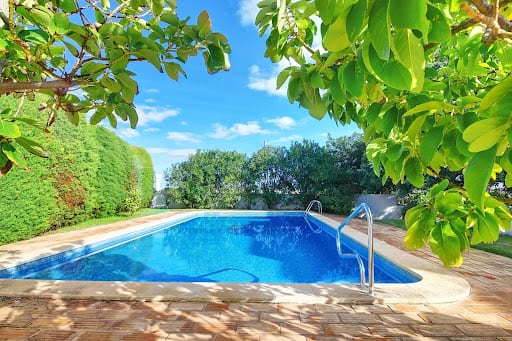The Truth About UV Rays and Chlorine

Friends, let’s talk about something important – UV rays and chlorine. We all love a good day out in the sun or a refreshing dip in the pool, but do we know the potential risks involved? It’s time we educate ourselves on the effects of UV rays and chlorine on our health and wellness.
UV rays can cause serious harm to our skin, while chlorine has its own set of potential side effects. But fear not! We’re here to explore these factors and provide you with the necessary safeguards to consider when exposed to them.
Key Takeaways:
- UV rays and chlorine can have harmful effects on our health.
- It’s important to protect ourselves from excessive exposure to sunlight.
- Chlorine helps maintain water quality in pools, but we need to be aware of potential concerns.
- UV radiation can lead to sunburn, premature aging, and increase the risk of skin cancer.
- We can minimize the potential effects of chlorine on our skin by taking certain precautions.
Understanding UV Rays
Ah, UV rays. The double-edged sword of sunbathing. On one hand, the sun offers a glorious source of warmth and happiness. On the other hand, it can cause damage to our skin, including sunburns and premature aging. So, let’s break it down, shall we?
The Different Types of UV Rays
First things first, there are three types of UV rays: UVA, UVB, and UVC. UVC rays are the most dangerous but thankfully, they don’t make it through the Earth’s atmosphere. UVA and UVB rays are the ones we need to worry about.
The Effects of UV Rays on the Skin
UV radiation can cause more than just sunburns. It can lead to premature aging, wrinkles, and even skin cancer. Yup, that’s right – skin cancer. So, it’s essential to take proper precautions when heading out into the sunlight.
Protecting Yourself from Excessive UV Exposure
So, how do we protect ourselves from UV rays? Well, there are a few options. First, you can limit your exposure to the sun, especially during peak hours when the sun is strongest. Second, you can wear protective clothing, such as hats and long-sleeved shirts. And, of course, always, always, always use sunscreen. Trust us, your skin will thank you.
The Importance of Sunlight
Now, before you start avoiding the sun altogether, let’s remember the importance of sunlight. Sunlight is essential to our overall health and well-being. It helps regulate our sleep cycle, keeps our bones strong, and even boosts our mood. So, let’s not be too quick to write off the sun entirely.
“The sun, with all those planets revolving around it and dependent on it, can still ripen a bunch of grapes as if it had nothing else in the universe to do.” – Galileo Galilei
So, there you have it – the lowdown on UV rays. Remember to protect yourself, but also don’t forget to enjoy the sun’s many benefits.
The Role of Chlorine
Ahh, the refreshing feeling of jumping into a cool pool on a hot day. But have you ever wondered how that water stays crystal clear and germ-free? The answer lies in the magic of chlorine. This powerful chemical is a staple in pool maintenance, effectively killing harmful bacteria and keeping water safe for swimming. But as with anything, there are pros and cons to its use.
The Pros
| Pros | Details |
| Effective germ killer | Chlorine is a potent disinfectant, killing harmful bacteria and germs that lurk in pool water. This makes swimming in a chlorinated pool much safer and healthier. |
| Easy maintenance | Once you find the right balance, maintaining a chlorinated pool is relatively straightforward. Regular testing and occasional adjustments are all it takes to keep your water sparkling clean. |
The Cons
As with most things in life, there are downsides to chlorinated pool water as well.
| Cons | Details |
| Skin irritation | Chlorine can be harsh on sensitive skin, potentially causing redness, itchiness, and dryness. To combat this, consider showering before and after swimming and applying moisturizer. |
| Unpleasant smell | Let’s face it, nobody enjoys the sharp smell of chlorine. If you want to reduce the odor, consider installing a pool cover and using less chlorine overall. |
| Environmental concerns | Chlorine is not the most eco-friendly pool water option out there. It can release harmful byproducts into the environment, and it’s not an ideal choice if you’re looking to reduce your environmental impact. |
Overall, chlorine is an effective solution for maintaining a sparkling clean pool, but it’s not without its downsides. Be mindful of its effects and take necessary precautions to ensure your safety and comfort while enjoying a refreshing dip. Consider advanced pool treatments like AquaSpada to reduce your pool’s dependency on chlorine.
UV Rays and Your Skin
Let’s face it, we all love soaking up the sun, but did you know that UV rays can have a serious impact on your skin’s health? From sunburns to premature aging, excessive exposure to UV radiation can cause a range of issues. That’s why protecting your skin from the sun’s harmful rays is crucial.
“The sun is shining, and we’re all feeling fine, but too much UV exposure can cause damage to our skin and increase the risk of skin cancer. Protecting yourself from UV rays should be a top priority, and it’s never too late to start!”
So, what can you do to keep your skin safe? Here are some tips:
- Cover up: Wearing protective clothing, such as long-sleeved shirts, pants, and hats, can shield your skin from UV rays.
- Stay in the shade: Seeking shade during peak UV hours can reduce your overall exposure to sunlight.
- Use sunscreen: Applying sunscreen with an SPF of at least 30 can provide an extra layer of protection for your skin.
- Avoid tanning beds: Tanning beds emit UV radiation, which can be just as harmful as the sun’s rays.
Remember, protecting your skin is not just about avoiding sunburns. It’s about preventing long-term damage, including wrinkles and skin cancer. So, the next time you’re planning to spend some time outdoors, make sure you’re taking the necessary precautions to protect your skin.
Chlorine and Skin Health
Ah, chlorine – the classic ingredient in pool water that can both delight and dismay our skin. While we love the refreshing sensation of a cool pool on a hot day, chlorine can also cause skin sensitivities that put a damper on the fun. In this section, we’ll delve into potential effects of chlorine on your skin.
“Chlorine, oh chlorine, how you can be so fickle. One moment we’re frolicking in the pool, and the next moment our skin is itchy and irritated.”
Some of us may react to chlorine with redness, itching, or even a rash. But why does this happen, and what can we do about it? The main reason behind chlorine-induced skin irritation is that it disrupts the natural balance of oils and bacteria on our skin, leading to dryness and inflammation. Chlorine also strips away our skin’s protective oils, leaving it vulnerable to further irritation. This can be especially problematic for those with pre-existing skin conditions like eczema or psoriasis.
But fear not – there are ways to minimize chlorine sensitivities. One simple solution is to shower before and after swimming to rinse off any chlorine residue lingering on your skin. You can also try using a moisturizer after swimming to replenish lost oils and soothe dry skin.
Facts about Chlorine and Skin Sensitivities
| Fact | What It Means |
| Chlorine can cause skin irritation in some people | If you experience itching, redness or a rash after swimming, chlorine sensitivity may be the cause. |
| Chlorine can strip protective oils from your skin | This can lead to dryness and further irritation. |
| Chlorine’s effects can be minimized with proper showering and moisturizing | Rinsing off before and after swimming and applying a moisturizer can help counteract the effects of chlorine on your skin. |
Overall, while chlorine can be a bit of a tricky ingredient when it comes to skin health, it doesn’t have to stop us from enjoying a refreshing dip in the pool. With a little bit of extra care and attention to our skin, we can make sure chlorine sensitivities don’t dampen our pool party spirits!
Balancing Sun and Pool Safety
When it comes to enjoying the sun and the pool, safety is key. We want to make sure that we’re having fun without putting our health at risk. That’s why it’s important to take precautions to protect ourselves from both sun and pool-related hazards.
Pool Safety Precautions
Before diving into the pool, it’s essential to ensure that it’s safe to swim. Check that the pool is properly maintained, with the right chemical balance, and that it meets safety standards. Make sure that all necessary pool equipment, such as a fence, drain covers, and lifesaving equipment, is in place. Consider taking a pool safety course to learn how to respond in case of an emergency.
| Pool Safety Tips | Sun Safety Tips |
| Shower before entering the pool to remove sweat and dirt that can react with chlorine and cause skin irritation. | Use sunscreen with an SPF of at least 30 and reapply every two hours, especially after swimming or sweating. |
| Never swim alone, and always supervise children around the pool. | Wear protective clothing, such as hats and sunglasses, to minimize sun exposure. |
| Make sure the pool is properly fenced and secured to prevent unauthorized access. | Seek shade during peak UV hours, typically between 10 am and 4 pm, when the sun’s rays are strongest. |
| Don’t run around the pool area, and never dive headfirst into shallow water. | Consider using a natural sunscreen with zinc oxide or titanium dioxide instead of chemical sunscreens. |
Sun Safety Precautions
While enjoying the sun is an essential part of summer, it’s critical to protect ourselves from harmful UV rays. Sunburn, premature aging, and even skin cancer are all risks associated with excessive sun exposure. To minimize these risks, take the following precautions:
- Apply sunscreen with an SPF of at least 30 and reapply every two hours, especially after swimming or sweating.
- Wear protective clothing, such as hats and sunglasses, to minimize sun exposure.
- Seek shade during peak UV hours, typically between 10 am and 4 pm, when the sun’s rays are strongest.
- Consider using a natural sunscreen with zinc oxide or titanium dioxide instead of chemical sunscreens.
By taking these simple precautions, we can enjoy a summer full of fun in the sun and the pool without sacrificing our health and wellbeing. So, go ahead and soak up the sun and enjoy a refreshing dip in the pool, but remember to prioritize your safety!
Additional Precautions and Alternatives
Now that we know the potential risks of UV rays and chlorine exposure, let’s explore additional precautions and alternatives to protect ourselves.
Precautions
One of the easiest ways to minimize UV ray exposure is to seek shade whenever possible, especially during peak hours. Wearing protective clothing like broad-brimmed hats and long-sleeved shirts can also help. But don’t forget about sunscreen! Look for natural sunscreens with mineral-based ingredients like zinc oxide and titanium dioxide to avoid harsh chemicals that may irritate your skin. And remember to reapply every two hours, or more often if you’re swimming or sweating.
Alternatives
If you’re concerned about chlorine exposure in pools, consider alternatives like saltwater systems or natural swimming ponds. Saltwater pools use a salt-chlorine generator to produce chlorine, resulting in lower levels of the chemical and fewer harsh odors and irritations. Natural swimming ponds use plants and beneficial bacteria to filter the water, providing a chemical-free swimming experience.
“When it comes to protecting yourself from UV rays and chlorine, it’s all about finding the right balance. By taking necessary precautions and considering alternatives, you can soak up the sun and swim in the pool with peace of mind.”
Conclusion
Protecting yourself from the harmful effects of UV rays and chlorine exposure is essential. Whether you’re lounging by the pool or taking a dip, take precautions with natural sunscreens, protective clothing, and seeking shade. And if you’re concerned about chlorine exposure, consider trying saltwater systems or natural swimming ponds. By making informed choices, you can minimize your risks and enjoy the sun and pool safely.
Conclusion
Well, folks, we’ve reached the end of our journey into the world of UV rays and chlorine. We hope you’ve enjoyed learning about these fascinating (and sometimes pesky) factors that can impact your health and wellness.
Remember, when it comes to sun and pool safety, it’s all about balance. We don’t want to scare you away from enjoying these fun activities, but we do want you to be informed and take necessary precautions. The last thing we want is for you to end up looking like a lobster or feeling sick from chlorine exposure.
Are you looking for other ways to enhance your pool? Reach out to ecoFINISH® to learn about the polyFIBRO® coatings and aquaBRIGHT™ aquatic coatings we offer!
So, what have we learned?
UV rays can be harmful to our skin, causing sunburns, premature aging, and increasing the risk of skin cancer. But fear not, with the right protection, such as sunscreen and protective clothing, you can still safely enjoy the sun’s rays.
Chlorine is an ally in maintaining water quality in pools, but it can also cause skin sensitivities. To minimize the risks, make sure to shower before and after swimming and use moisturizers to replenish your skin.
And finally, don’t be afraid to explore alternatives to chlorinated pools, such as saltwater systems or natural swimming ponds. They may provide a more natural and eco-friendly swimming option.
So, there you have it, folks! We hope you feel better equipped to make informed decisions the next time you hit the beach or jump into a pool. Stay safe out there, and don’t forget your sunscreen!
FAQ
What are UV rays?
UV rays, short for ultraviolet rays, are a type of electromagnetic radiation that comes from the sun. They are invisible to the naked eye and can be categorized into three types: UVA, UVB, and UVC.
How do UV rays affect the skin?
UV rays can have damaging effects on the skin, including sunburns, premature aging, and an increased risk of skin cancer. Protecting yourself from excessive UV exposure is essential for maintaining healthy skin.
What is the role of chlorine in pool water?
Chlorine plays a crucial role in maintaining water quality in pools. It helps to kill bacteria, viruses, and other harmful microorganisms that can cause infections or illnesses. However, excessive chlorine exposure may have potential side effects.
Can chlorine affect the skin?
Yes, chlorine exposure can impact the skin. It can cause dryness, itching, and irritations, particularly for individuals with sensitive skin. Taking proper precautions, such as showering before and after swimming, can help minimize these effects.
How can I protect myself from UV rays?
To protect yourself from UV rays, you should use sunscreen with a high SPF, wear protective clothing, such as hats and sunglasses, and seek shade when the sun’s rays are strongest, usually between 10 am and 4 pm.
Are there alternatives to chlorinated pools?
Yes, there are alternatives to chlorinated pools, such as saltwater systems or natural swimming ponds. These alternatives use different methods to maintain water quality and can be more suitable for individuals with chlorine sensitivities.
What are some additional precautions I can take?
In addition to sunscreen and protective clothing, you can also consider using natural sunscreens without harsh chemicals, seeking shade during peak UV hours, and regularly moisturizing your skin to minimize potential damage from UV rays.
How can I balance sun and pool safety?
Balancing sun and pool safety is crucial. You should ensure proper sunscreen usage, wear protective gear when swimming, and maintain appropriate chlorine levels in pools to enjoy both activities while safeguarding your health.
